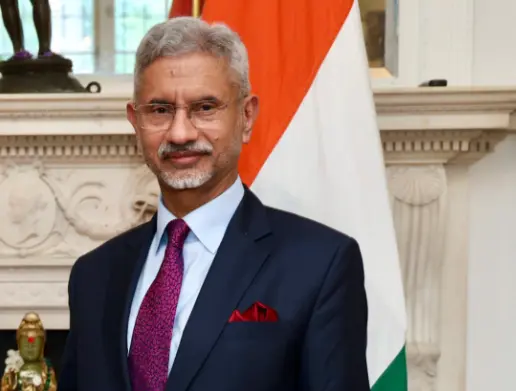
Strategic Calm: India’s Measured Response to US Tariff Threat
Tariff Tremors – In a world increasingly shaped by economic coercion and geopolitical brinkmanship, India’s External Affairs Minister S. Jaishankar has once again demonstrated the art of diplomatic poise. Responding to a proposed US bill that threatens a staggering 500% tariff on countries continuing trade with Russia including India Jaishankar’s words were deliberate and composed: “We’ll cross that bridge when we come to it.”
The bill, introduced by Republican Senator Lindsey Graham, aims to penalize nations that maintain energy ties with Russia, particularly in the wake of the ongoing Ukraine conflict. With over 80 co-sponsors in the US Senate, the legislation could potentially override a presidential veto, making it a serious diplomatic flashpoint.
India, which has significantly increased its imports of discounted Russian crude since 2022, finds itself in the crosshairs. Yet, Jaishankar’s response reflects a broader strategy—asserting sovereignty in foreign policy while keeping diplomatic channels open. He confirmed that India’s concerns regarding energy security have been conveyed to Senator Graham and other US officials, underscoring that New Delhi is not blindsided but actively engaged.
Energy Security vs. Geopolitical Pressure: India’s Tightrope Walk
India’s energy strategy has undergone a dramatic shift since the Russia-Ukraine war began. Once heavily reliant on Middle Eastern oil, India now sources over 40% of its crude imports from Russia, capitalizing on discounted rates amid Western sanctions. This pivot has not only helped stabilize domestic fuel prices but also reinforced India’s stance that national interest trumps external pressure.
The proposed US bill, however, seeks to disrupt this balance. Dubbed an “economic bunker buster,” it threatens to impose punitive tariffs on imports from countries like India and China, accusing them of indirectly supporting Russia’s war efforts. Senator Graham has argued that such measures are necessary to force Moscow to the negotiating table and end the conflict in Ukraine.
But India’s position remains clear: its energy needs are non-negotiable. Jaishankar has repeatedly emphasized that India’s oil purchases are guided by affordability, accessibility, and strategic autonomy. “We are not sitting on the fence,” he once said in a previous context, “we are on the side of peace.” This nuanced stance allows India to maintain relations with both the West and Russia without compromising its core interests.
Moreover, the bill includes a potential carveout for nations that support Ukraine’s defense, which could offer India some diplomatic wiggle room. However, the ambiguity surrounding this exemption means that India must prepare for all scenarios, including the possibility of retaliatory tariffs on its exports to the US.
Diplomacy in Action: What This Means for India-US Relations
The tariff threat comes at a time when India-US relations are otherwise on an upswing. From defense cooperation to technology transfers and trade negotiations, the two democracies have deepened their strategic partnership. A proposed trade deal is also in the works, which could reduce existing tariffs and enhance bilateral commerce.
Yet, the sanctions bill poses a test. It challenges the delicate balance India maintains between its traditional ties with Russia and its growing alignment with the West. Jaishankar’s diplomatic finesse lies in navigating this complexity without alienating either side.
India’s response strategy includes:
- Engaging US lawmakers through its embassy and diplomatic channels
- Highlighting the economic and strategic rationale behind its Russian oil imports
- Exploring alternative energy sources to diversify its portfolio
- Strengthening regional alliances to counterbalance external pressure
For students of international relations, this episode offers a masterclass in realpolitik. It shows how nations must constantly weigh moral imperatives against material needs, and how diplomacy often involves managing contradictions rather than resolving them.
Final Thoughts on Tariff Tremors
- Jaishankar’s composed response to the US tariff threat is more than a soundbite, it’s a reflection of India’s evolving global posture. In a world where economic tools are increasingly used as weapons, India’s insistence on strategic autonomy and energy security sends a powerful message: national interest is not up for negotiation.
As the bill moves through the US Congress, all eyes will be on how India balances principle with pragmatism. But if Jaishankar’s words are any indication, New Delhi is ready to face the challenge if and when it comes.
AI Video of ‘Free Tehran’ Fuels Global Shock-Fire and Illusion; Israel-Iran War Kills 900
Premeditated Horror: Kolkata Law College Gang-Rape Case Exposes Chilling Abuse of Power
Stay updated with the latest news on Rapido Updates. Keep yourself updated with The World, India News, Entertainment, Market, Automobile, Gadgets, Sports, and many more
3 thoughts on “Tariff Tremors: Jaishankar’s Calm Defiance Amid US 500% Sanctions Threat”